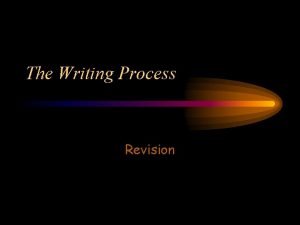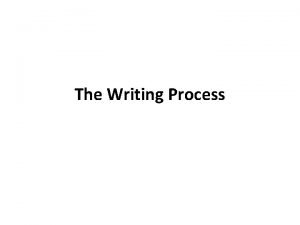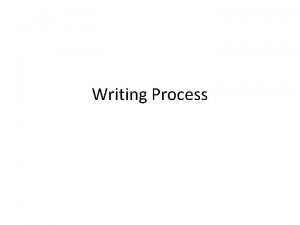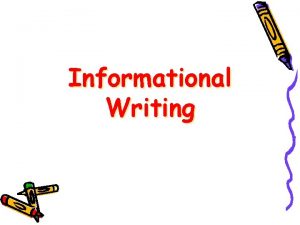The Writing Process Revision What is Revision Revision















- Slides: 15

The Writing Process Revision

What is Revision? • Revision is NOT editing. – Editors look for clear, accurate prose. – Editors examine writing for stylistic consistency. – Some concerns of editors: • Grammar • Word choice • Sentence structure

What is Revision? • Revision is NOT proofreading. • Proofreading is concerned with the rules of grammar, punctuation, spelling, and formatting. • Proofreaders look for: – – Correct documentation Subject/verb agreement Use of commas Can you think of any other proofreading concerns?

What is Revision? • Revision literally means “to see again. ” • Revision allows a writer to take a fresh, objective look at a previous draft. • Revision is concerned with ideas and logic.

The Writing Process • Because writing is a process comprised of many different kinds of activities and skills, the boundaries between revising, editing, and proofreading sometimes collapse.

Boundaries: Editing and Revising • For example, some writers try to draft perfect prose from the outset, but trying to combine editing and drafting into one step often makes the writing process slow and extremely painful!

Editing and Revising • If you edit consistently from the beginning, you may get too attached to your first draft. This could make it difficult to make significant changes during the revising phase.

All About Revising • Revision is one part of the writing process that requires ample time and a change of gears.

Preparing to Revise • After the experimental drafting phase, take a break from your draft. – Take a walk. – Read something entertaining. – Put the draft out of your mind. – Gauge time well. Give yourself “breathing time” before revising, but keep your final deadline in mind.

Consider the Whole Work • Does this piece satisfy the original assignment and your primary purpose as a writer? • Do you address the appropriate audience? Do your readers have all of the necessary information?

Consider Content • Is thesis or controlling idea clear and well supported? • Do your ideas flow logically? • Are your ideas expressed in clear, focused language?

Consider Form • Is the introduction engaging? • Does each paragraph support and expand thesis? • Do paragraphs connect logically? Have you used effective transitional phrases? • Does each paragraph have an effective topic sentence?

Consider the Conclusion • Does the conclusion proceed naturally from the preceding paragraphs? • Is the conclusion satisfying?

Weeding • Don’t be afraid to make significant changes to your drafts. • Weed out unnecessary paragraphs, sentences, and words.

Remember… Revising is the key to good writing!
 Passive sentence
Passive sentence Hình ảnh bộ gõ cơ thể búng tay
Hình ảnh bộ gõ cơ thể búng tay Ng-html
Ng-html Bổ thể
Bổ thể Tỉ lệ cơ thể trẻ em
Tỉ lệ cơ thể trẻ em Voi kéo gỗ như thế nào
Voi kéo gỗ như thế nào Chụp tư thế worms-breton
Chụp tư thế worms-breton Chúa sống lại
Chúa sống lại Môn thể thao bắt đầu bằng từ đua
Môn thể thao bắt đầu bằng từ đua Thế nào là hệ số cao nhất
Thế nào là hệ số cao nhất Các châu lục và đại dương trên thế giới
Các châu lục và đại dương trên thế giới Cong thức tính động năng
Cong thức tính động năng Trời xanh đây là của chúng ta thể thơ
Trời xanh đây là của chúng ta thể thơ Mật thư anh em như thể tay chân
Mật thư anh em như thể tay chân Phép trừ bù
Phép trừ bù độ dài liên kết
độ dài liên kết





























